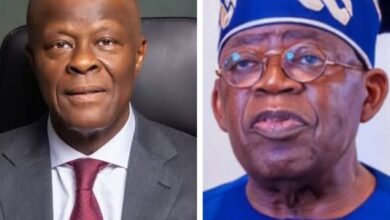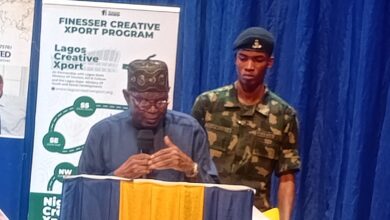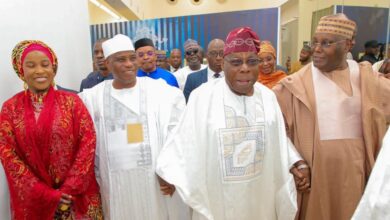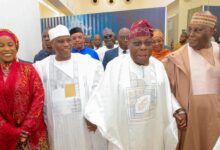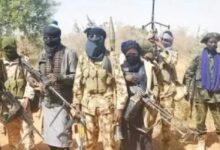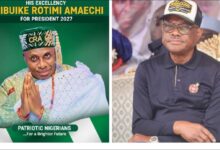World Bank dismisses Tinubu’s reforms, says it fails to reduce poverty – Media
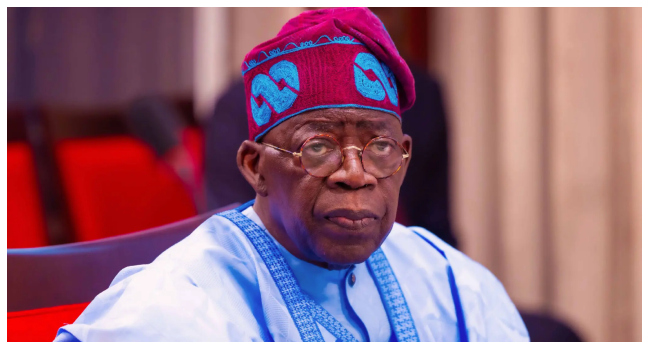
Tinubu had declared that Nigeria has “turned the corner” on its economic and social challenges, assuring citizens that the sacrifices of the past two years were beginning to yield measurable results.
The World Bank has said that despite the expansion of the Nigeria’s economy and the revenue increase, poverty rate remains alarmingly high.
The Bretton Woods institution declared that 139 million Nigerians are living in poverty in 2025 despite the economic reforms embarked upon by President Bola Ahmed Tinubu.

Country Director, World Bank Nigeria, Mathew Verghis, spoke in Abuja at the launch of the Nigerian Development Update where the bank also projected that Nigeria’s economy would grow by 4.4 per cent in 2027.
The World Bank’s verdict is coming a few weeks after Tinubu praised his government for the economic rebound being witnessed in the country.
Tinubu had declared that Nigeria has “turned the corner” on its economic and social challenges, assuring citizens that the sacrifices of the past two years were beginning to yield measurable results.
During a live nationwide broadcast to commemorate Nigeria’s 65th Independence anniversary, Tinubu stressed that his administration’s reforms were already repositioning the country on the path of stability, growth and self-sufficiency.
“I am pleased to report that we have finally turned the corner. The worst is over. Yesterday’s pains are giving way to relief. I salute your endurance, support and understanding,” the president said. “I will continue to work for you and justify the confidence you reposed in me to steer the ship of our nation to a safe harbour.”
Daily Trust reports that the removal of subsidy from premium motor spirit (PMS), otherwise known as petroleum, has freed more revenues to the coffers of the federal government with states also getting more allocations.
The monetary policy reforms have also seen the foreign reserves rising to over $43 billion; while the exchange rate market has stabilised. Inflation eased for the fifth consecutive month to 20.12 per cent in August.
But the World Bank’s Country Director said: “So, these results are exactly what you need to see in a stabilisation. These are big achievements. However, despite these stabilisation gains, many Nigerians are still struggling. Most households are struggling with eroded purchasing power.
“In 2025, we estimate that 139 million Nigerians live in poverty. So, the challenge is clear: how to translate the gains from the stabilisation reforms into better living standards for all.”
He stated that the federal government must reduce inflation, particularly food inflation, ensure effective use of public funds and expand safety nets, to address the high rate of poverty in the country and ensure that citizens enjoy the gains of reforms.
“Food inflation affects everybody but particularly the poor and has the potential to undermine political support for the reforms. Use public resources more effectively ensuring that spending drives real development results that benefit people and three, expanding the safety net so that the poorest and vulnerable get support,” he added.
‘Economy to grow by 4.4% in 2027’
The World Bank projected that Nigeria’s economy would grow by 4.4 per cent in 2027, compared to the 4.2 per cent earlier projected for the year 2025.
It explained that the growth would be driven by services and supported by agriculture and non-oil industry.
Samer Matta, the World Bank’s Senior Economist for Nigeria, in a presentation titled, ‘From Policy to People: Bringing the Reform Gains Home’, said inflation is expected to gradually ease but remain elevated, requiring sustained monetary discipline and structural reforms to tackle food prices, the “biggest tax on the poor”.
The senior economist noted that the outlook for Nigeria’s economy remains cautiously optimistic.
According to the NDU, Nigeria’s economy expanded by 3.9 per cent year-on-year in the first half of 2025, up from 3.5 per cent in the same period of 2024.
“Growth was driven by strong performance in services and non-oil industries, alongside improvements in oil production and agriculture.
“The country’s external position has strengthened, with foreign reserves exceeding $42 billion and the current account surplus rising to 6.1% of GDP, supported by higher non-oil exports and lower oil imports.
“On the fiscal side, despite lower oil prices, the federal deficit is projected at 2.6% of GDP in 2025, broadly unchanged from 2024, while public debt is expected to decline for the first time in over a decade — from 42.9% to 39.8% of GDP,” the report said.
It cautioned that the macroeconomic gains had yet to translate into tangible improvements in people’s lives, adding that many households continued to face hardship, with poverty and food insecurity remaining high.
The NDU noted that Nigeria’s poor households, who spend up to 70 per cent of their income on food, have seen the cost of a basic food basket rise fivefold between 2019 and 2024, highlighting the need for continued efforts to reduce inflation and support the vulnerable.
Report a wakeup call – Economists
Professor Uche Uwaleke, a member of the Daily Trust Board of Economists, described the report as a wakeup call for Nigeria.
He said: “I think the World Bank NDU report for Nigeria is a wake-up call to the authorities that it is not yet uhuru.
“It recognises that macroeconomic gains achieved so far have yet to translate to improved welfare conditions for the average Nigerian with over 130 million people still in multidimensional poverty.”
He said the report had made a number of recommendations which the authorities should take seriously, including putting in place structural reforms to tackle food prices as well as ensuring effective use of public funds.
“However, its recommendation of tight monetary policy in order to have inflation rate moderate to 15.8% in 2027 is at variance with its projection of low interest rate environment expected to help bring about a decline in deficit to GDP as well as public debt to GDP ratios.
“Further, without easing monetary policy, not only will the projected growth rate of 4.4% in 2027 be at risk, but also the quality of such growth will be such that will continue to weaken the productive sectors of the economy.
“It goes without saying that in order to achieve inclusive growth and sustainable development, as well as lower inflation rate, both fiscal and monetary policies must be deployed to support the primary (agriculture) and secondary (manufacturing) sectors of the economy.
“Government at all levels should take advantage of improved revenues to invest in human capital development that is linked to the productive sectors of the economy,” he added.
‘Economic growth not inclusive’
Speaking on the issue, an economist with Al-Hikmah University, Ilorin, Dr Omotayo Lawal, said the World Bank report indicates that while the Nigerian economy may record marginal growth, such growth is not inclusive and does not translate into improved welfare for the majority of citizens.
According to him, the situation suggests that the policy reforms currently being implemented by the government are not yielding the desired outcomes.
He said it was either the policies were ineffective or their benefits were not filtering down to the poor and vulnerable.
When such outcomes persist, he added, the right thing to do is to return to the drawing board, reassess the policies, and make the necessary adjustments.
Lawal identified several factors behind these failures. One major issue, he noted, is the absence of policy continuity in Nigeria.
Every new administration, he noted, tends to discard the economic policies of its predecessor and introduce new ones.
“This discontinuity disrupts progress and weakens institutional memory,” he stated.
He said this pattern could be traced from the administrations of former Presidents Umaru Yar’adua, Goodluck Jonathan, late Muhammadu Buhari and Tinubu.
“Without consistent policies, data for evaluation become unreliable, and long-term economic plans lose coherence. The result is that even with several policy reforms, poverty continues to rise. When inflation remains high and purchasing power declines, no policy can be said to be working.
“Currently, inflation in Nigeria is in double digits, which is unacceptable for any developing economy. High inflation erodes real income, weakens consumer confidence, and constrains private investment. No country can sustain inclusive growth in such conditions”, he said.
Lawal cited the recent conflict between the Dangote Refinery and the Nigerian National Petroleum Company (NNPC) as evidence of deeper structural problems.
He said the Nigerian economy had also been subjected to multiple external and domestic shocks.
“The COVID-19 pandemic severely disrupted livelihoods and productivity, while climate change, smuggling, and insecurity have compounded these challenges.
“Externally, global tensions such as the trade disputes between the United States and China have affected emerging markets like Nigeria through supply chain disruptions and commodity price volatility. These shocks expose the economy’s structural weaknesses and lack of resilience”, he stated.
Lawal said regional inequality and geographical disparities had further deepened poverty.
“Government interventions are often skewed toward certain regions, leaving others behind”.
He cited the North where insecurity has displaced many farmers, resulting in food shortages and unemployment.
“When people cannot farm or trade freely, he noted, the poverty rate inevitably rises. In this context, the World Bank’s projection that millions more Nigerians will fall below the poverty line is not far-fetched,” he said.
He recommended that the government stabilise prices and control inflation as a matter of urgency.
“The Central Bank of Nigeria (CBN) should adopt a tighter monetary policy stance to curb inflationary pressures and stabilise the naira, as price stability is the foundation for sustainable growth.
“There is a need for proper coordination between fiscal and monetary policies. When Nigeria faced a recession in 2016 and 2017, the combination of fiscal stimulus and monetary adjustments under the Economic Recovery and Growth Plan helped the economy move out of negative growth, even though the recovery was slow and fragile. Coordination between the Ministry of Finance and the CBN remains crucial”.
He urged the government to boost agricultural productivity and rural development, describing food security as central to poverty reduction.
“When people have access to affordable food their disposable income increases, and poverty declines. The agricultural sector needs better infrastructure, mechanisation, and access to credit.
“Borrowing is not necessarily bad but must be strategic and purposeful. Loans should be channelled into productive sectors that can generate revenue to repay them, such as infrastructure, power and manufacturing,” he stated.
He also advised Nigeria to strengthen its debt management and ensure transparency in loan utilisation.
He further called for strengthening governance and institutional capacity to reduce corruption and ensure public funds reach their intended targets.
Citing recent reports of the Economic and Financial Crimes Commission (EFCC) recovering over N13.5 billion, he said corruption remains a major drain on national resources.
Lawal urged that recovered funds be transparently directed toward education, healthcare and job creation.
“Nigeria must invest in building resilient institutions that can withstand external shocks and maintain policy consistency beyond political cycles. Without institutional stability, every reform effort will be short-lived,” he said.
Afenifere dismisses claim of economic turnaround
Pan-Yoruba socio-political organisation, Afenifere, in a statement by its leader, Oba Oladipo Olaitan and the National Publicity Secretary, Prince Justice Faloye, described the claim of economic turnaround as media spin.
It said the claim that the economy had stabilized “is a euphemism that the economy has reached rock bottom after being pushed off the cliff with subsidy removal and devaluation policies.”
The statement read in part, “When a $10 billion subsidy with $200 billion production multiplier effects is removed, when the economy falls by $200 billion, it would stop falling. The question is what happens to the 7 million businesses that collapsed and tens of millions pushed into poverty, are they just collateral damage of self-induced economic destabilisation mislabelled as economic reforms?
“The fall of real wages by 300 per cent make claims of an economic turnaround unfounded. While a select few elites might take advantage of the devaluation, the average Nigerian workers’ purchasing power has been wiped off by devaluation and inflation, and until the majority get their wages adjusted there can be no turnaround.
“The administration’s increase in minimum wage to N70, 000 benefited less than 5 per cent of workers. The Nigerian worker has been economically reformed to slave wages, with even those at the pinnacle of the academia and armed forces paid peanuts. A professor is paid less than unemployed persons in Europe and the Americas, while the basic wages of army generals just about equals the amount paid unemployed people.”
Citizens speak
Some Nigerians, who were interviewed by Daily Trust yesterday, said economy had been shaped by reforms which had determined the financial health of the citizens.
Rajih Edatomola described the country’s economy as confusing and challenging, saying both the government and the people seem to lack mutual trust and integrity.
“When the government tries to implement positive reforms, the people sometimes frustrate the process through corruption, non-compliance, or resistance to change.
“On the other hand, when the people are willing to work hard and move forward, those in government divert public funds and misuse opportunities meant for development,” he said.
Babatunde Rahman added that most of the government’s economic reforms are stifling the growth of MSME.
“Many institutions that are supposed to support progress are instead frustrating genuine organizations and entrepreneurs that want to contribute positively.
“Some governors and leaders are not performing or delivering the dividends of democracy to the masses, and this has deepened poverty and frustration across the nation,” he said.
He urged the government to give an enabling environment to build mutual trust and national cohesion.
“To move forward, Nigerians both leaders and citizens, must first identify and agree on what we truly want for our country. We must be united in purpose and begin to marshal practical plans and collective actions to achieve national progress.
“Until there is honesty, accountability, and a shared vision, economic stability and growth will remain difficult to achieve,” he said.
Ibrahim Rufai, a resident of Kano has a different perspective of the economy, saying prices of food crops like rice, beans and corn are falling due largely to government’s lift on restriction on importation of food items.
However, Rufai said he is worried at the same time because farmers like him who had invested much may suffer losses because prices are increasingly going down.
“I am glad prices of food items crashed but I also fear for my farming business because I bought fertiliser which was expensive this farming season. My only hope and prayer is that government will find a way of incentivising farmers by buying their harvested crops above the existing market price just to encourage them to continue,” he said.
Another resident, Hamza Bunkure said he has not seen any economic improvement in the country because people still find it difficult to buy food though prices have dropped.
Bunkure said, “I don’t want to believe that the economy is doing well because people still find it difficult to keep food on the table. Electricity is still not stable while fuel remains expensive. Even cooking gas is becoming out of reach. I bought it today at N1550 per Kg something I usually buy at about N900.” DAILY TRUST


